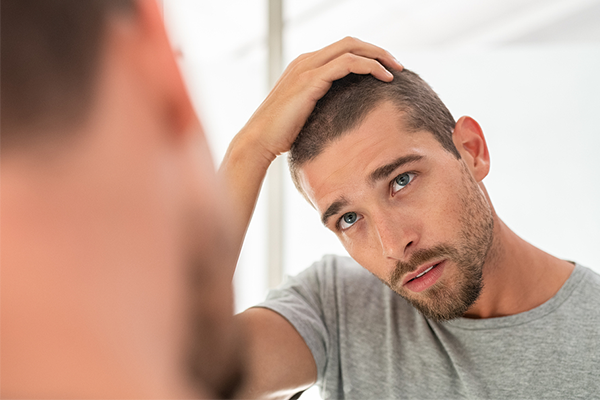Hey guys: If you’re worried that you’re losing your hair, you actually might be.
About two out of three men have some degree of hair loss by the time they’re 35, according to the American Hair Loss Association. “Many men start seeing this in their 20s, but certainly by their 50s, up to 85 percent of men will see a difference in their hair,” said Dr. Morgan Thakore, a dermatologist with Augusta University Health.
And as much as we all love guys like Bruce Willis who have boldly flaunted a smooth head for decades, it’s not as easy to be that accepting when it’s your own head. So here’s what you need to know:
- Recognize the classic signs. Male pattern baldness usually starts with hair thinning at the top of the head (the crown) and at the temples (the classic “horseshoe pattern”).
- Embrace “hair wellness.” Hair wellness, rather than hair baldness, is the newest buzzword to help eliminate the stigma of having thinning hair and getting treatment. If you start to see signs of early baldness, “Go ahead and get the Rogaine,” said Thakore.Rogaine, or minoxidil, has been used for decades to safely support hair growth and the hair’s growth period, which means you keep hair strands longer. It’s available as a liquid or a foam that you apply directly to the scalp. Rogaine can be used by both adult men and women, but not women who are pregnant or breastfeeding. Another medicine, Finasteride actually stops hair loss and grows new hair by decreasing a scalp hormone called DHT, which seems to make hair follicles thinner. But, the tablets should only be used by adult men. Women and children should not touch the medication. Some physicians suggest taking both together to give you the best chance to regain your hair.
- Be aware of side effects. Too much really can be a good thing. Don’t overuse minoxidil, since that can cause some serious side effects like chest pain, rapid heartbeat, dizziness and fainting. Also, a known side effect of finasteride in some men is a reduced sex drive.
- Anti-baldness shampoos are not a thing. Use them if you like the way they smell or the way they make you feel, but “there’s nothing special in these shampoos to help treat baldness,” said Thakore.
- Be patient. It probably took a while for your hair to start to get thin. So it will take a while to grow back. Remember, it can take up to two months to see an inch of hair, and that’s for normal growth. Minoxidil can take up to four months to start working, and finasteride can take from six months to a year.
- Take care of yourself. Do a little work to make sure your scalp and hair are as healthy as possible. So reduce your stress levels, exercise, eat a good diet (you know the drill) to help ensure your body has good blood flow and the nutrients it needs to be the healthiest it can be.
- See a doctor. Even if your dad went bald at age 35 and you’re pretty sure it’s genetic, it’s not a bad idea to visit a dermatologist to make sure there’s nothing else going on and that the OTC remedy you’re using is right for you. “There are many factors that can influence why you might be losing your hair,” said Thakore. “We’re able to take a closer look, even biopsy the scalp, to make sure it’s nothing else and to possibly suggest other therapies.”
We know you’re busy, that’s why we’re bringing world-class healthcare to your neighborhood. Augusta University Care Centers are right in your community with teams of skilled primary care and specialty care doctors. Make an appointment at our Family Medicine clinic or at one of our care centers today, visit augustahealth.org, or call 706-721-2273 (CARE).





